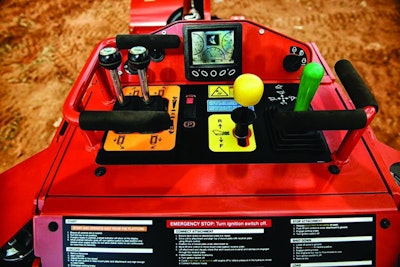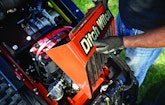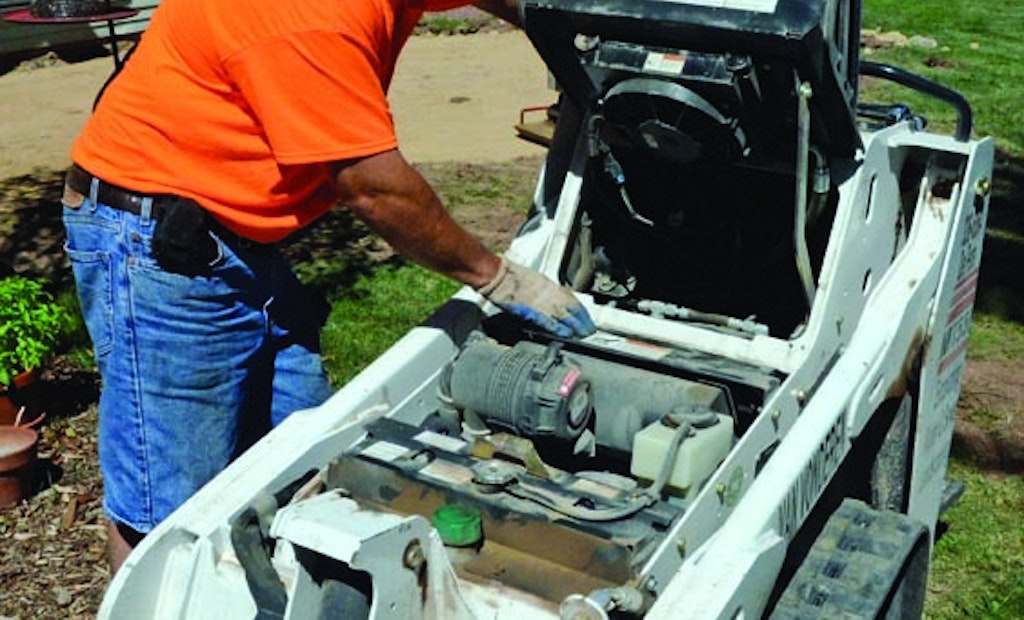Interested in Excavating?
Get Excavating articles, news and videos right in your inbox! Sign up now.
Excavating + Get AlertsMini track loaders are versatile, easily maneuverable machines that can be a valuable asset for any installer, especially when putting in onsite systems in tight spaces and when you need equipment to tread lightly. When properly cared for, these workhorse machines can provide many years of trouble-free use.
Steve Van Vonderen, owner of Steve Van Vonderen Excavating in De Pere, Wis., says lubrication tops his service list. He finds multiple uses for his two Bobcat mini-loaders every week and keeps them busy all summer.
“The main thing is to keep your pins greased all the time because it keeps the machine tight and it responds better to your commands,” he says. “No. 2 is the track.” Proper tension is vital to optimal performance.
“If you run them too loose you’re going to have tracks coming off all the time, which leads to a lot of downtime on the job site. And if you run them too tight you’re going to wear tracks out prematurely along with the components that go with them, such as the front and rear idlers and weight-carrying idlers in the center.”
And keep the undercarriage clean, especially during the colder months, he says. Van Vonderen takes 10 to 15 minutes at the end of the day looking for dirt and debris that might have become lodged between the tracks. “If you don’t, the next morning it will cost you hours of time trying to get that machine moving again,” he says.
Van Vonderen follows a daily inspection regimen for his loaders, checking the engine oil, hydraulic fluid and radiator. Every 90 days he brings the machines into the shop for closer inspection.
“We have a pit and check the hoses and couplings; give it a good pressure wash and regrease it,” he says. Van Vonderen also keeps a paper file on each machine he owns, recording its service history, noting the day and hours on the machine when parts are changed out.
“That way we can get a feel for how many hours we’re putting on the machine in a year,” he says.
Scratches and rust spots are touched up as well.
“We try to keep our name and graphics looking good so people can see it. We’ve got the phone number on there too so people can give us a call.”
Living in a northern climate, Van Vonderen adds an anti-gel supplement to the diesel fuel and stores the machine in the shop at night when possible.
To ensure the fuel line stays clean, Van Vonderen installs a clear, glass-body prefilter where the fuel comes out of the tank. “That way we can watch for any algae buildup in our tanks,” he says. “We feel that helps with the regular fuel filter life on these machines.”
Chris Austinson, Bobcat product specialist for mini-loaders, says it’s important to follow the owner’s manual on all service intervals.
Bobcat recommends checking oil level and air filters every 10 hours, as well as cleaning debris from the radiator and oil cooler areas; draining water and sediment from the fuel filter; checking hydraulic levels; and lubricating lift arms, cylinders, pivot pins, wedges, rollers and idlers with a multipurpose lithium-based grease. It’s also recommended operators check the parking brake, indicators and lights to ensure they are functioning properly.
Every 50 hours, Bobcat recommends checking hydraulic hoses and the tube line for damage and leaks, as well as the undercarriage for loose bolts and nuts and adjusting track tension as needed.
When changing fluids in your machine, Austinson says it’s important to stay within the manufacturer’s guidelines.
“I know at job sites people have a tendency to want to change brands, but one of the big things from an OEM standpoint is there has been a lot of tests on those fluids to understand what they do to the components,’’ he says. “Everything is not created the same. A lot of chemistry goes into those fluids.”
Bobcat recommends changing engine oil and filter every 100 hours, as well as the battery and drive. Every 250 hours or once a year replace the fuel filter and check the lift arm lockout manual bypass control.
Austinson is also an advocate of documenting service and repairs.
“Personally, I think that’s a big value. When you go back to sell the machine to a second or third owner, it gives that owner some confidence that the machine has been taken care of, the service has been done,” he says. “It’s also a good example of what the running costs are for that machine.”
Nick Crossley, Ditch Witch’s product support specialist, trencher and compact utility equipment, cautions not to overlook attachments and hydraulic systems in the maintenance program.
“We have in our operator’s manual instructions on how to check the fittings and your hydraulic line wearing gloves and using a piece of cardboard,” he says. “While the unit is running at a low idle, you run the cardboard up and down your hoses, looking for any leaks or pinholes that may cause you problems.”
As a helpful reminder, Ditch Witch’s latest model, the SK850, includes service intervals in the LCD display. “We tried to take some of the guesswork out of that by having it right there on the machine,” says Andrew Schuermann, product manager for trenchers and compact utility equipment.
Ditch Witch also uses Gar-Max-style bushings to eliminate the need for daily maintenance.
Kent Van Kooten, training and development specialist with Vermeer, suggests checking safety equipment, such as the neutral start interlock and operator presence systems, every 100 to 200 hours.
“The more maintenance you do, the better,” Van Kooten says. “The machine’s going to last longer for you and be a better return on investment. A well-maintained machine also is a safer machine. Listen for unusual squeaks or noises and fix them before they become a major problem.”









